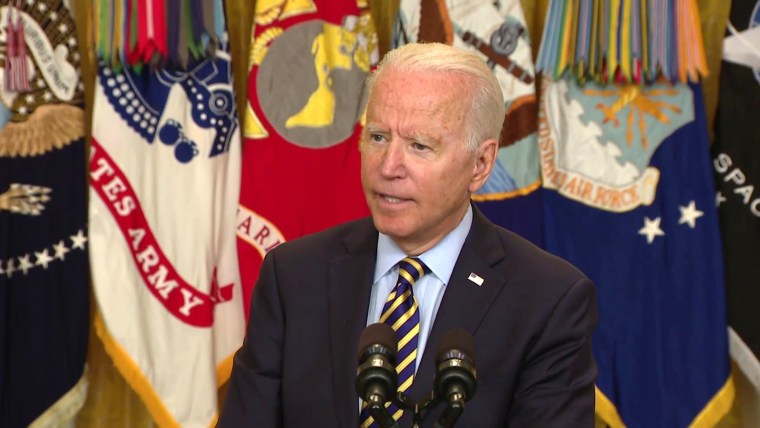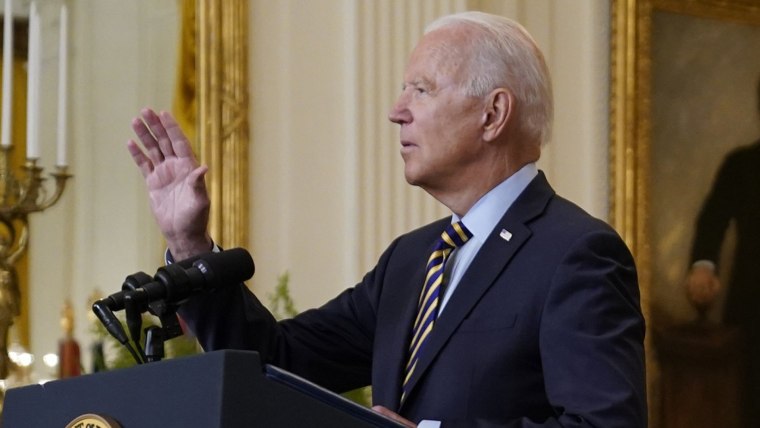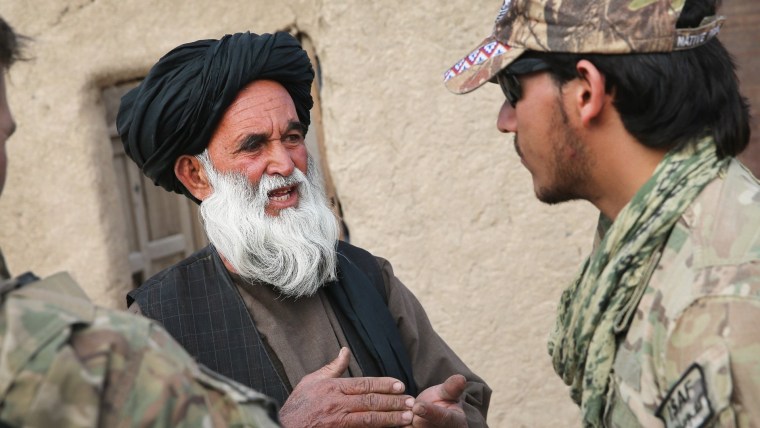WASHINGTON — Biden administration officials have been locked in an internal debate over plans to evacuate Afghans who worked for the U.S. military, with some officials arguing against taking the evacuees to U.S. territory where they would have more legal rights once they arrived, two congressional aides and three people familiar with the matter told NBC News.
"There seem to be two sides that haven't reached a consensus in the administration itself," said one refugee rights advocate, who was not authorized to speak on the record. "They're wasting time. These are people's lives."
As U.S. troops wrap up a withdrawal from Afghanistan, Biden administration officials have struggled to shape a plan to protect Afghans who worked for the U.S. government and now face retribution from the Taliban. Veterans groups, refugee advocates and lawmakers have called for an urgent evacuation and accused the administration of moving too slowly, potentially putting Afghan partners' lives at risk.
After mounting pressure from Congress and an increasingly dire situation on the ground in Afghanistan, the administration now says it will evacuate an unspecified number of Afghans out of the country. President Joe Biden said Thursday the flights could begin this month. But he also suggested most of the Afghans who have applied for visas under a special program will not be flown to U.S. territory, and instead to third countries where their documents will be processed.
In the administration's discussions on the issue, some officials at the Department of Homeland Security and the State Department have voiced misgivings about evacuating Afghan partners to Guam or other U.S. territory where their visa applications would be reviewed, two congressional aides and three people familiar with the matter said.
Those officials believe there are "additional legal issues you encounter when you bring them to U.S. territory," a congressional aide said.
If an Afghan's visa request were denied on U.S. territory, legal experts said, the applicant would have recourse to appeal the decision under American immigration law, possibly opening up a legal process that could take months to resolve. In a third country, the Afghan applicant would have virtually no grounds to appeal the rejection of a U.S. visa request or deportation back to Afghanistan, as the applicant would be subject to the third country's laws, the experts said.
Asked about the internal debate, a spokesperson for DHS said: “The characterization is absolutely false.”
“We continue to do everything possible to help provide qualifying Afghans with Special Immigrant Visas, in support of the State Department’s program,” the spokesperson said, referring to the visa program created for Afghans who worked with U.S. troops. “We will not compromise security in doing so.”
The State Department did not respond to a request for comment on internal discussions. The department has said it is working to streamline the visa application process for former Afghan interpreters and that it is considering expediting visas for other vulnerable Afghans who do not qualify for the Special Immigrant Visa program.
The White House National Security Council declined to comment when asked about internal discussions about evacuating Afghans.
A senior administration official, speaking on condition of anonymity, told reporters that potentially relocating an individual to U.S. territory was "a national security issue" and that the administration had to follow relevant laws and ensure national security concerns were addressed.
Activists and lawmakers have appealed for a large-scale evacuation of Afghans to Guam or other U.S. territory, citing a previous evacuation to Guam involving 6,600 Iraqi Kurds in 1996. They say flying the Afghans to a third country could cause further delays and leave the Afghans in legal limbo indefinitely.
In the case of the Kurd evacuation, the operation was organized in a matter of days and less than one percent of the applicants had their visa requests denied, according to Chris Purdy of the Veterans for American Ideals program at Human Rights First.
In remarks on the U.S. troop withdrawal from Afghanistan, President Biden said Thursday his administration recognizes the importance of protecting Afghans who served as interpreters, drivers or in other jobs for U.S. troops, and that the U.S. will evacuate an unspecified number out of Afghanistan.
"There is a home for you in the United States, if you so choose, and we will stand with you just as you stood with us," Biden said.
But the president also appeared to rule out flying out most of the Afghan applicants to U.S. territory, saying "the law did not allow" for that option but that the administration wanted Congress to change the law.
Administration officials afterward said applicants for the Special Immigrant Visa program, which was set up for Afghan and Iraqi interpreters, could not legally be flown to the U.S. before their visas were approved. They left open the possibility that a smaller number of Afghans who did not qualify for the SIV program but who performed work linked to the U.S. could be brought to U.S. territory under "humanitarian parole" provisions in the law.
Lawyers with refugee organizations took issue with the president's remarks and expressed dismay that the administration appeared to be planning to take most of the Afghan evacuees to third countries. They said U.S. law included provisions to allow the Afghans to fly directly to U.S. territory to have their visa applications reviewed there, under humanitarian parole provisions.
Biden also said about 2,500 visas had been issued to the former Afghan interpreters, and that fewer than half of them had decided to fly out of the country.
Refugee advocates, however, said that when visas are granted, typically the applicant has to wait for months for a flight to be booked by international refugee organizations, as they lack the funds to buy their own commercial flight out sooner.
It remained unclear which third countries would agree to accept the Afghan evacuees, but U.S. officials were speaking to the United Arab Emirates and Kuwait about hosting some of the Afghan evacuees, two defense officials told NBC News.
The administration also had to consider the human rights records of the countries accepting the Afghans, the officials added. U.S. officials previously explored the possibility of flying some of the Afghan evacuees to Central Asian countries bordering Afghanistan that have faced criticism over human rights, according to a current U.S. official, three congressional aides and refugee advocates.
Refugee and immigration rights groups criticized the administration for not launching the evacuation earlier and said the rationale for avoiding flights to U.S. territory was baseless, as the Afghans had already been vetted as interpreters for American troops and diplomats.
"Why are these concerns being raised now, years after these allies served our mission? Our Afghan allies are at risk, not risk factors," said Krish O'Mara Vignarajah, president and CEO of the Lutheran Immigration and Refugee Service.
"It is time for the delays to end and the administration to take action to keep our promise and protect our allies."
Administration officials also were discussing the pool of Afghans to be evacuated, with the decision hinging in part on the status of the Afghans' visa applications.
The State Department has said out of roughly 18,000 applications in the SIV program, about 9,000 were at an advanced stage in the application process while the remainder had not yet filled out the necessary forms and had merely expressed an interest in the program.
Refugee advocates and veterans groups questioned that assessment and said that in many cases Afghans had filled out the paperwork but faced red tape and delays lasting months or years. They said the U.S. program has been plagued by incessant bureaucratic delays and that Afghans should not pay the price for the program's shortcomings.
"It is disingenuous of the government to claim that half of all applicants currently in the process are ineligible for visas or have merely 'expressed an interest' or 'sent an email,'" said Adam Bates, policy counsel for the International Refugee Assistance Project.
"Many of them have been prevented from moving on to the next step in the process by government delays or have been erroneously denied and had to resubmit their applications. Nobody should be left behind because the government was too slow to process their applications," Bates said.
A federal court ruled in 2019 that the U.S. government had failed to abide by a law requiring it to process SIV applications within nine months.
According to No One Left Behind, a nonprofit founded by veterans to help Afghan interpreters secure visas, the Taliban have killed several hundred Afghans and their family members for their association with the U.S. since 2014.
"how" - Google News
July 09, 2021 at 11:00PM
https://ift.tt/3wvAMNk
Biden administration still debating internally how to evacuate Afghan interpreters - NBC News
"how" - Google News
https://ift.tt/2MfXd3I
Bagikan Berita Ini

















0 Response to "Biden administration still debating internally how to evacuate Afghan interpreters - NBC News"
Post a Comment